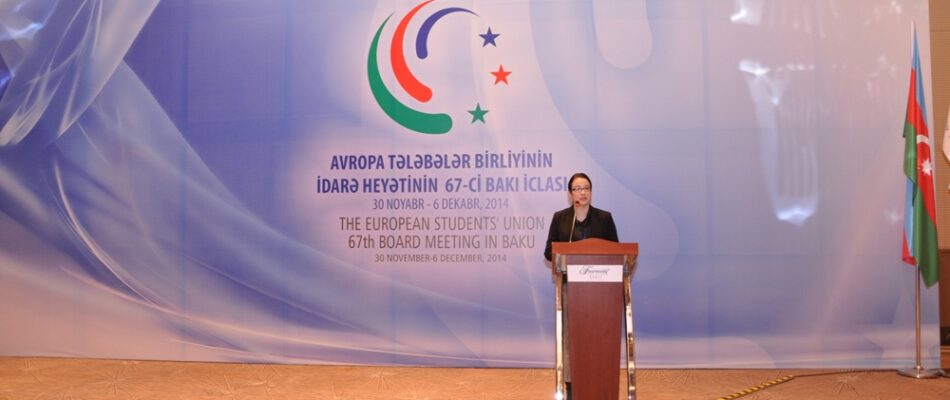
Human rights a core priority in 2015
BAKU – The European Students’ Union (ESU) will enhance its work on human rights in 2015. This was confirmed in the new plan of work that European student representatives adopted at ESU’s Board Meeting in Baku, Azerbaijan, from 1 to 5 December 2014.
ESU organised a two day long seminar on human rights preceding the Board Meeting, where student representatives were invited to discuss relevant international conventions and how they are applied and function in practice. This was the first time that ESU has held a seminar especially dedicated to human rights preceding its Board Meeting. The participants were invited to discussion groups, on subjects such as how schools and universities could be protected from conflicts. That discussion looked into the new initiative called ”Guidelines for Protecting Schools and Universities from Military Use During Armed Conflict.”
It has now been decided that ESU will hold another session on human rights at one of its major events in 2015. Moreover, ESU will formalise its partnerships with organisations and networks that work on human rights in higher education. ESU will also continue to promote the importance of human rights, especially the freedom of opinion, the right to access education, the rights of LGTBQ people, as well as other issues at the global level.
“We are very excited to take this policy area further in 2015, especially when human rights and academic freedom are increasingly being threatened across the world. We will strive to raise awareness and deepen understanding of the student movements’ role in human rights debates,” says Elisabeth Gehrke, ESU’s Chairperson.
ESU also adopted new strategic political priorities, which will guide ESU’s work all the way through to 2017. ESU will continue its work on its four core policy areas, namely: mobility and internationalisation; quality; the social dimension; and, public responsibility, financing and governance of higher education.
Several other important documents were adopted at this Board Meeting including amendments to ESU’s core policy papers and resolutions. Students took a stance on national developments in higher education, such as academic freedom in Denmark, a Swiss initiative to change the country’s student grant system, the withdrawal of proposed tuition fees for non-EU/EEA students in Finland, accreditation and student loans in the Netherlands, the Akademikerball in Vienna, and the practice of Uni-Assists in Germany.
Additionally, ESU adopted resolutions on a few global issues, including two on the Transatlantic Trade and Investment Partnership (TTIP), protection of schools and universities during armed conflicts. ESU’s associate member, the Erasmus Student Network, also proposed a resolution on a European directive on student visas and mobility. That resolution was adopted unanimously.
The participants agreed to give Alianta studentilor din Moldova (ASM) a candidate status for membership of ESU. ESU will follow-up on this application by examining whether ASM’s operation fulfils the criteria needed for membership.
Background
ESU’s Board Meetings are organised twice a year, where delegates from all 47 national unions of students that are members of the organisation are invited. The Board Meetings act thus as the highest governing body of ESU, in which delegates get the opportunity to shape ESU’s policies and plan of work. Delegates are also introduced to national cases and developments in higher education in Europe. Each country is given the value of two votes at these meetings.
This time, the Board Meeting was co-organised with the Azerbaijan Student Youth Organisations’ Union (ASYOU) and the Azerbaijan Student Union (ASU).
— END —
For more information, please contact:
Elisabeth Gehrke, ESU Chairperson: +32/479.591.499 // elisabeth@esu-online.org or Robert Hlynur Baldursson, ESU Communications Manager: +32/473.669.894 // robert@esu-online.org

The European Students’ Union, headquartered in Brussels, is the umbrella organisation of 47 national unions of students from 39 European countries. ESU represents and promotes the educational, social, economical and cultural interests of students at the European level. Through its member unions, ESU represents over 11 million students in Europe. To find out more about ESU, follow us on Twitter @ESUtwt, check out or Facebook page or visit www.esu-online.org. ESU celebrates its 30th anniversary in 2012.
